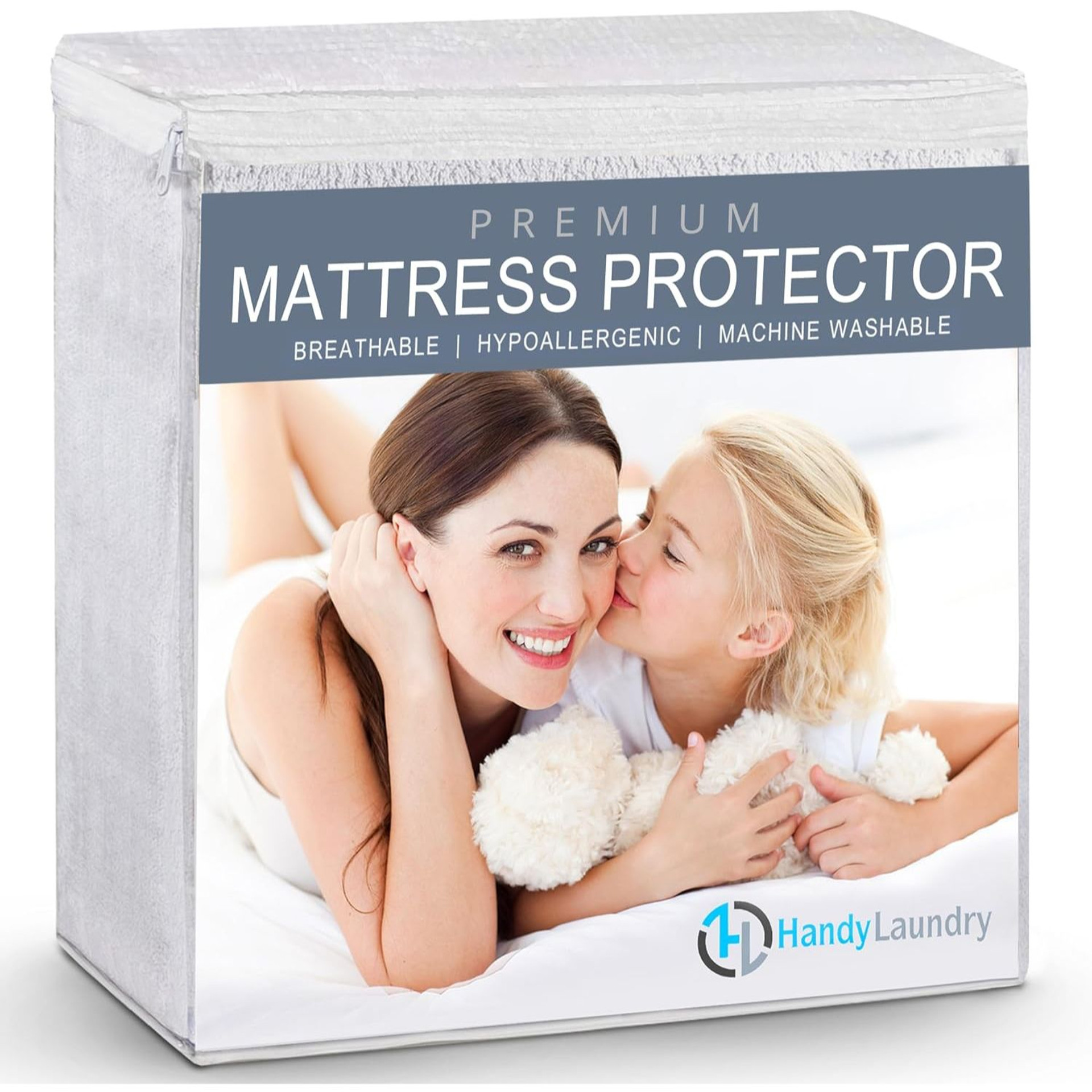When shopping for bedding, you might wonder whether you need a mattress cover or a mattress protector. Though they sound similar, each serves a unique purpose that can impact your sleep quality and the longevity of your mattress. A mattress cover primarily adds comfort, while a mattress protector protects your mattress from spills and dirt. So, how do you decide which one you need? Let’s look deeper into their functions and materials to help you make an informed choice that suits your needs.
Sleep soundly and protect your mattress with our Waterproof Mattress Protector—shop now for ultimate peace of mind!
Definition of a Mattress Cover
Encasing your mattress in a protective fabric, a mattress cover is a thin, removable layer designed to keep dust, dirt, and stains at bay. This essential bedding accessory guarantees your mattress stays cleaner and lasts longer by shielding it from everyday wear and tear.
Why Choose A Mattress Cover?
A mattress cover can be a great option to enhance your mattress's comfort, durability, and appearance. Here are some key reasons why you might choose a mattress cover:
Comfort
Mattress covers made from materials like memory foam, cotton, or wool can change the feel of your mattress, giving it a softer or firmer surface. A mattress cover can be an easy and affordable solution for a more customized sleep experience.
Style
Mattress covers are available in different colors, patterns, and textures, so you can coordinate your bed with the rest of the bedroom decor. Depending on your preference, a mattress cover can help you achieve your desired style, whether you prefer a neutral look or something more vibrant.
Budget Option
If one wants to revive the feel of an old mattress without considerable expense, the solution lies in using a mattress cover. A cover would allow a person to enjoy a soft cushioning layer with all the attributes of a brand-new mattress minus the cost.
Protecting Against Basic Wear and Tear
A mattress cover protects against dust, dirt, and accidental damage, especially with kids or pets. It could help extend the life of your mattress by keeping it clean and in good shape.
Types Of Mattress Covers
Mattress covers come in various types to suit different needs and preferences. These covers are typically thin, fitted sheets that encase your mattress like a protective layer. They’re designed to shield the mattress from dust, dirt, and minor spills, making them essential for basic protection.
Here are some common types of mattress covers:
- Basic Covers: These provide simple protection against dust and dirt but aren’t waterproof. They’re easy to remove and wash, ensuring straightforward maintenance.
- Waterproof Covers: While not as common, some mattress covers offer waterproof protection against spills and stains.
- Padded Covers: These offer extra comfort with minimal padding. They can enhance your mattress’s overall feel without the bulk of a mattress protector.
- Hypoallergenic Covers: Designed to protect against allergens such as dust mites and pollen, these covers are perfect for people with allergies.
Definition of a Mattress Protector
A mattress protector is a thin, breathable barrier that protects your mattress from moisture, dirt, and stains. It acts as a protective layer without altering your mattress's feel, ensuring you still enjoy your bed’s original comfort. Unlike mattress covers, mattress protectors are specifically crafted to defend your mattress from potential damage.
Many mattress protectors are waterproof, using materials that repel liquid to keep your mattress dry and clean. However, some waterproof mattress protectors cause overheating as they might restrict airflow. you can also find non-waterproof options if moisture protection isn’t your primary concern. Regardless of the type, these protectors are typically constructed with elastic edges, allowing them to fit securely over your mattress like a fitted sheet. This guarantees the protector stays in place, providing consistent protection without shifting around.
Why You Should Use A Mattress Protector?
If you prioritize protecting your mattress against spills, stains, and allergens, consider getting a mattress protector. Here are some reasons you'll like a mattress protector:
Allergen Protection
Most mattress protectors have a coating that is resistant to dust mites, pet dander, and other allergens. This is highly beneficial for people with allergies, as a mattress protector can make a sleep space cleaner and healthier.
Waterproofing
If you tend to wet the bed, sweat at night, or spill drinks on your mattress, a mattress protector provides the ultimate waterproof protection. It prevents liquids from penetrating your mattress, thereby not allowing stains, bacteria, or mold growth.
Easy Maintenance
Mattress protectors are easily clean, removed, and often machine washable. This is helpful for people who want their mattresses to remain spotless without too much work.
The mattress protector protects the extensiveness of the mattress's life from spills, stains, and allergens. That's a great investment if you want your mattress to stay in good condition for years.
Hypoallergenic Properties
Many mattress protectors are made to help manage allergies. These can block dust mites, pet dander, and other allergens that cause breathing problems or discomfort at night.
A mattress protector's main purpose is to extend your mattress's life by safeguarding it against spills, allergens, and daily wear and tear.
Types of Mattress Protectors
While mattress covers offer basic protection and comfort, mattress protectors take it further by providing more extensive defense against various threats to your mattress. Let’s explore the types of mattress protectors you can choose from:
- Fitted Protectors: These fit snugly over your mattress like a sheet, providing a protective layer that stays in place. They’re common and suitable for most sleepers, offering essential protection without much hassle.
- Top Protectors: These cover only the top of your mattress, making them easy to remove and wash. They’re ideal for quick maintenance and spot cleaning, focusing on preserving the mattress surface.
- Encasement Protectors: These fully encase your mattress and secure with a zipper closure. This mattress encasement offers thorough protection
Key Differences Between Mattress Covers and Mattress Protectors
At first glance, mattress covers and protectors may appear similar, but they differ significantly in functionality, materials, and intended use. Let’s dive deeper into the key differences between these two types of products.
| Feature | Mattress Cover | Mattress Protector |
| Primary Purpose | Comfort, style, and basic protection | Full protection from allergens, moisture, and stains |
| Materials | Cotton, polyester, memory foam, etc. | Waterproof or water-resistant materials, often with allergy-proof properties |
| Fit | Loosely fits over the mattress, similar to a fitted sheet | A tight, snug fit with elastic edges usually covers the entire mattress |
| Thickness | Typically thicker and more durable than protectors, sometimes adding padding | Thin and lightweight for a tight fit |
| Waterproof | Not always waterproof, though some may offer limited protection | Waterproof mattress protector works as a water-resistant, & moisture-proof for ultimate protection |
| Maintenance | Generally machine washable | Usually machine washable, depending on the material |
| Protection Level | Protects against dust and dirt, some wear and tear | Protects from spills, stains, allergens, and bacteria |
| Size Options | Available in various sizes, from twin to queen to king | Available in various sizes, from twin to queen to king |
| Special Features | It may come with decorative features to match the bedroom style | Often includes hypoallergenic, dust-mite-resistant features |
Which One Should You Choose?
Choosing between a mattress cover and a mattress protector depends largely on your needs and preferences. If you’re looking for something that enhances comfort, adjusts the feel of your mattress, and adds a touch of style to your bedroom, a mattress cover is likely the better choice. On the other hand, if you’re more concerned about protecting your mattress from spills, stains, allergens, and other environmental factors, a mattress protector is your best bet.
In fact, for some, a mattress cover and a mattress protector can provide the ultimate protection. The mattress cover provides comfort and style, while the mattress protector offers protection from allergens and liquids.
Conclusion
Ultimately, your choice between a mattress cover and a mattress protector depends on your needs. If you prioritize comfort and added cushioning, go for a mattress cover. But if you’re focused on keeping your mattress safe from spills, dirt, and stains, a mattress protector is the way to go. Both options have their benefits, so consider what’s most important for you to enjoy a good night’s sleep and extend your mattress’s lifespan.
Frequently Asked Questions
Can a mattress protector prevent bed bugs?
Even if a protector could protect against allergens and dust mites, this wouldn't quite exclude bed bugs; for full protection against bed bugs, use products known for blocking them from getting inside.
Do mattress protectors come in different sizes?
Yes, mattress protectors come in many sizes, including twin, queen, and king, and some custom options. Check the product details for the exact measurements to ensure a good fit for your mattress.
Are mattress covers and protectors safe for babies?
Yes, mattress covers and protectors can be safe for babies, but they must be made of baby-safe materials. Oeko-Tex-certified items ensure that no harmful chemicals are used. Hypoallergenic and breathable materials are the best choice for babies, as they create a safe and comfortable sleeping environment.



